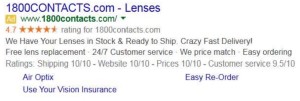August 10, 2016
 This Monday, the Federal Trade Commission (the “FTC” or “Commission”) commenced an administrative proceeding against 1-800 Contacts, Inc. (“1-800 Contacts”), alleging that the online contact lens retailer had entered into anti-competitive search ad bidding agreements with its rivals.
This Monday, the Federal Trade Commission (the “FTC” or “Commission”) commenced an administrative proceeding against 1-800 Contacts, Inc. (“1-800 Contacts”), alleging that the online contact lens retailer had entered into anti-competitive search ad bidding agreements with its rivals.
Should sellers and advertisers be concerned about how they police their brands?
1-800 Contacts’ Search Ad Bidding Agreements
Online search engines, such as Google (Google AdWords), Yahoo (Yahoo Gemini) and Bing (Bing Ads), allow sellers and their affiliates to purchase search ads to display advertising copy above or next to targeted search results.
According to court and FTC records, 1-800 Contacts fiercely opposes competitors’ use of 1-800 Contacts-based targeted search ad keywords. Between 2004 and 2013, 1-800 Contacts allegedly reached agreements with fourteen competing online contact lens sellers, which contained clauses providing that the parties:
- would not bid against one another in auctions for search ads targeting the other party’s respective trademarked terms; and
- would employ “negative keywords” directing search engines not to display search ads in response to consumer queries that include the other party’s trademarked terms, even if the search engines’ algorithms determine that the ads would be relevant and useful to the user.
In 2013, after a six-year legal battle, 1-800 Contacts made headlines when the Tenth Circuit Court of Appeals held that Lens.com, Inc.’s use of “1-800 Contacts” search ad keywords was highly unlikely to divert consumers. Notwithstanding this judgment, 1-800 Contacts purportedly continued to aggressively police the above-referenced bidding agreements, complaining to competitors when 1-800 Contacts suspected a violation, threatening further litigation and demanding compliance.
FTC Administrative Complaint
On August 8, 2016, the FTC filed an administrative complaint against 1-800 Contacts, claiming that the above-referenced search ad bidding agreements suppressed competition in violation of the FTC Act’s deceptive advertising restrictions.
Notably, the Commission warned that it may seek an injunction prohibiting 1-800 Contacts from filing or threatening to file trademark infringement, deceptive advertising or unfair competition lawsuits against any contact lens retailer based on the use of 1-800 Contacts’ trademarks in search ads.
Sellers and Advertisers: Take Heed
As we have previously reported, traditionally many sellers have diligently enforced their trademark rights when competitors used search ad keywords targeting one the companies’ valuable trademarks or brands. However, as the above-referenced case indicates, the FTC is cracking down on certain trademark enforcement practices related to search advertising. As such, sellers and advertisers should consult with experienced advertising and intellectual property counsel before commencing, or threatening to commence, legal action related to third-party use of search ad keywords targeting their brands.
If you are a seller or advertiser engaged in search advertising, or if you are involved in a trademark dispute, please e-mail us at info@kleinmoynihan.com or call us at (212) 246-0900.
The material contained herein is provided for informational purposes only and is not legal advice, nor is it a substitute for obtaining legal advice from an attorney. Each situation is unique, and you should not act or rely on any information contained herein without seeking the advice of an experienced attorney.
Attorney Advertising
Related Blog Posts:
Trademark Enforcement May Lower Search Advertising Costs



